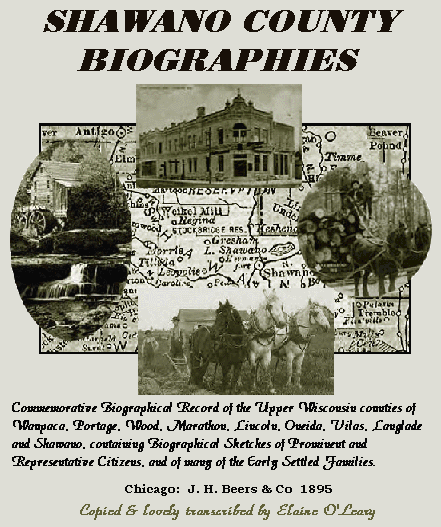
Pages 348 - 9
REV. ODORIC IGNAZ DERENTHAL, 0. S. F., priest among the Indians
in Shawano county, was born in Roesebeck, Prussia, Germany, July 14, 1856,
a son of Theodore and Mary (Wieners) Derenthal.
Theodore Derentbral was a farmer, and is a successful man. He
now has 140 acres of land, and both he and his wife live on the home farm,
which is worked by their son Bernard. They reared a family of children,
most of whom died in infancy, and four are still living, as follows: Odoric,
subject of this sketch; Bernhard, in Germany; Paulina, Mrs. Gustaf Scheidt;
and Augusta, at home with her parents and brother. Odoric Derenthal
was reared at home until twelve years of age, when he began his studies
for the priesthood. He attended for three years the High School at Ruethen,
taught by the able Rev. Rector L. Becker; for two years at Warburg, and
then in 1873, joined the order of Franciscans at Warendorf, Westphalia,
where he passed the novitiate; then studied in Europe until 1875, when
he came to America, landing in New York June 30, 1875. Coming to Teutopolis,
Ill., he studied there one year, and then went to Quincy, Ill., where he
took philosophy, remaining two years. Completing his studies there, he
took up theology in St. Louis, where he remained three years, and was ordained
priest in that city May 16, 1880.
Rev. Odoric Derenthal's first congregation was in Superior, Wis.,
where he had 125 families. He was engaged chiefly in the Chippewa Indian
mission, and was there four years, with another confrere. As a missionary
priest he would start out with a guide to his different missions, in a
territory some two hundred miles in circuit, lodging in a wigwam, in which
the services were held, and remaining in one place about three days would
go on to another, and so on, having a repetition of these services in about
twenty different places, all from fifteen to twenty-five miles apart. The
Indians were at that time in an uncivilized condition. He first gained
their conversion, then baptized them, and so performed his missionary duties
until he was sent, in 1885, to Keshena, where he has since been. He founded
an Indian boarding school of about one hundred Indian pupils, which he
has increased to 170 at the present time, while his congregation numbers
one hundred families. He has one assistant priest, Rev. Blase Krake, who
tends to two other Indian congregations—Kenepowa and Little Oconto.
Together with Rev. B. Krake, five Brothers of the Order of St. Francis,
six Sisters of St. Joseph, one lay-teacher and several other employes,
he is conducting an excellent Indian school, which has been built up through
the efforts of Father Derenthal and his assistant, and received a medal
and several diplomas at the Columbian Exposition in 1893. This institution,
called St. Joseph's Indian Industrial School, teaches all the pupils, male
and female, from six to twenty-three years of age, in the ordinary branches
of an English education, and also in different industries and trades, such
as farming, gardening, carpentering, shoe-making; cookery, laundering,
needlework, dairywork, etc. The Church has been organized since 1892.
At the time of Father Derenthal's coming here there had been
great destruction by fire, February 22, 1884, and he had the loss replaced
at an expense of $30,000; they had another fire, in 1891, which caused
a loss of about $20,000, which had again to be restored. They now have
a school which cost $50,000, and is well-equipped. The government pays
a part of the expense of $108 per capita; the contract for the present
fiscal year is for 105 pupils, and the rest of the expenses has to be supplied
by charity. The missionary priest receives no consideration for his services,
even his garb being a present from his benefactors. The six Sisters employed
as teachers receive $800 altogether. Rev. Father Derenthal has another
mission, the Stockbridge mission, seven miles from here, and they have
a church there which cost $2,200, built in 1894, and dedicated November
22, same year. |